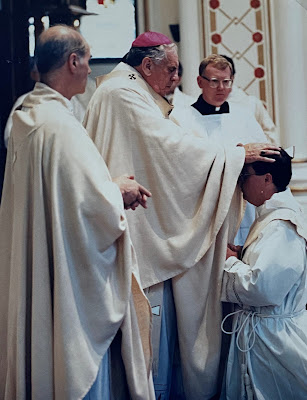Tomorrow will be the 35th
anniversary of my ordination as a priest. I planned to preach today about my
gratitude for these joyful years of ministry; I was sure something in the readings
would provide a launching pad for those thoughts.
No such luck. Our first treating, psalm and gospel are all on a single topic: death.
I thought maybe, especially in the heat, I could just forget about the readings and talk on the priesthood. But that bothered my priestly conscience: I rarely preach about death, and the Sunday readings don’t often suggest it.
I think the Lord gave my conscience a nudge. I was looking at the photo album from my ordination day. And while it brought back some wonderful memories, I couldn't help but notice: an awful lot of the people in the photos are now dead. In one photo, everyone’s dead but me!
You might think that would make me feel sad. But it doesn't, and it shouldn't. Because dealing with death is a fundamental part of our Christian lives and has been an important part of my own priestly and personal journey.
The first reading points out a key fact: our loving God did not create death. His plan for creation did not include death, which was a result of the failure and sin of our first parents. John Milton’s poem “Paradise Lost” tells of “man’s first disobedience, and the fruit of that forbidden tree, whose mortal taste brought death into the world, and all our woe.”
Blaming God for the fact of death is not consistent with the story of creation presented to us in the Book of Genesis.
Today’s Gospel story of the raising of a little girl is less direct. It asks rather than answers the question ‘why doesn’t Jesus work such miracles for us?’. The New Testament has many examples of Jesus bringing people back to life or at least saving their lives. Has the Lord given up that ministry?
The answer isn’t obvious, but I think it’s certain. Every miracle of Jesus is a sign—a sign of salvation. Yes, Jesus is moved by human pity, but still more by knowing he was sent to conquer sickness and death forever. It is his saving death and resurrection, not miracles, that overcomes “every disorder which is caused in some degree by sin.” (Xavier Léon-Dufour, Dictionary of Biblical Theology, 363)
On this hot day, there's no time to say more, except to add that the sacraments, and the Catholic funeral rites, do bring Christ’s strength and consolation to both the dying and the bereaved. That’s my own experience: the Lord has made his goodness known to me throughout my priestly life in numerous ways, but particularly through the death of loved ones.
One final thought connected to my ordination anniversary, prompted by the presence on the altar of Marty Cayer. As you know, he will be serving as our parish deacon after his ordination in October. But he first knelt beside me on the altar 35 years ago, as an altar boy at St. Patrick’s, where I was assigned after ordination.
Last week, Marty said to me “You know, Father, this may sound a bit strange, but Christ the Redeemer reminds me a lot of St. Pat’s.”
It was a bit strange that our suburban parish in 2021 would remind him of an inner-city one in 1986.
But Marty was right, and he was saying something very important. Despite thirty-five years of social change, much of it negative, public failures by priests, scandals, and sorrows, not to mention a very different demographic, he finds here a community of Christians living their faith with the same conviction and courage as the wonderful new Canadians and old guard Catholics at 12th and Main.
It was a great privilege to begin my priestly ministry with a community as strong as St. Pat’s, but it’s a greater privilege still to continue it here at Christ the Redeemer.


No comments:
Post a Comment